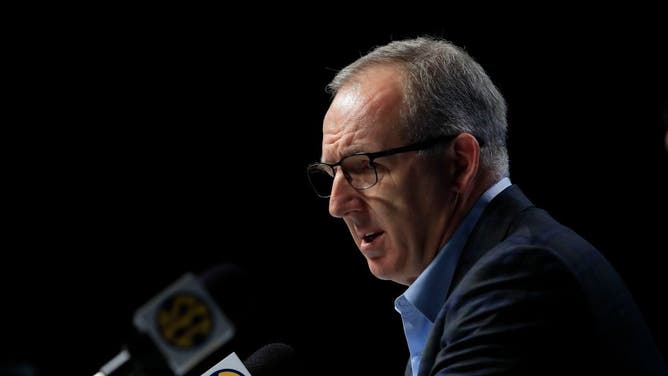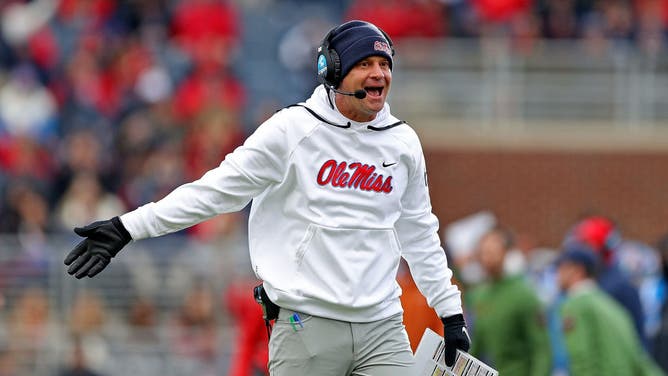Nick Saban, Others Might Be Weary Of Collectives, NIL And Paying Players, But Stop Acting Like Fans Will Leave
We are once again discussing how Congress can get involved in the ongoing fight to save what is left of college athletics. As we sit just two months away from another transfer portal period that is likely to be the wildest we've seen yet, it was former Alabama coach Nick Saban being asked once again to discuss how we got to this point, and how we get out of it.
The current landscape of college athletics is filled with collectives doing everything they can to raise enough money from donors to buy a national championship. But the only thing that is actually different in this era is how we classify the money being paid to student athletes.
What was once a forbidden topic, paying players to attend a particular school, has gotten so out of control in the public eye that we've now gotten Congress involved to come up with a solution on how to govern the current system. It wasn't long ago that teams were ‘allegedly’ paying players under the table to attend a certain school, finding different ways to compensate an athlete without getting caught by the NCAA.
But ever since the first day that NIL was introduced to the college sports world, coaches and donors have found a different way to classify how they are landing prospects. None of this is really new, given that the top players coming out of high school were having multiple schools quietly start a bidding war for their services. Then, it was the start of the ‘collective’ era in college sports that really started a conversation on how to control the NFL free agency-like system that coaches are currently discussing on what seems like a daily basis.
Have things gotten out of control over the last four years with NIL? Sure, but what did the NCAA and leaders around college athletics expect? Once collectives were formed around the country, there was no pulling back on the reins, and this led to meetings in front of congressional leaders.
Do you really think senators like Ted Cruz are focused on college athletics with a presidential election around the corner? There are more important things to worry about at this moment than what a player is making from a university-backed collective that is putting together the funds to buy a competitive team.
Nick Saban, On The Current State Of College Athletics Is The Same Old Pitch
On Tuesday, former Alabama coach Nick Saban sat in a room surrounded by his former athletic director Greg Byrne, ACC Commissioner Jim Phillips and other speakers, discussing how the sport has changed for the worse, while also being one of the reasons why he retired from coaching.
This was more of a lecture series by Saban compared to actually coming up with solutions, and that's OK, as long as they know none of this is new information that will somehow change the way college sports operate. The phrase ‘revenue sharing’ continues to be spoken of, without a clear path on how to accomplish this goal, when they've had almost four years to figure it out.
"We have collectives that in some places are raising huge amounts of money and going to compete against places that do not have the same resources to raise those kinds of funds to pay players," Nick Saban said on Tuesday. "You have a pay-for-play system and a free agency system that has no guidelines, so there's no competitive balance. I think there's going to be a lot of places that will say that, and we'll create a case system where the rich will get richer and the poor will get poorer and eventually fans will look at it and say, 'I don't really want to watch this game.'"
I get it, collectives are the easy target right now because there is a fight between the schools and these groups over where the money is going. The university would love to see its big athletic donors pushing that money towards facilities and other projects, while at the same time the coaches are trying to win games, so paying the players is a pivotal part of the system.
But let's not forget that universities need these collectives for the on-field product, even if it's tiled in one direction towards the more high-profile schools. It was just two months ago that Alabama's collective ‘Yea Alabama’ went on a marketing campaign that was blasted on every type of social media channel, and into the email accounts of donors across the country.
For the first time since Nick Saban took the Alabama job, the folks in Tuscaloosa had to market their football program to the masses, while trying to raise enough money to compete with other schools that were already established in the ‘collective’ space.
I don't disagree that we will one day have a revenue sharing model that will be governed by either the NCAA or conferences. One reason why the SEC and Big Ten decided to join forces to legislate certain aspects of college athletics was to one day come up with a revenue sharing model for its athletes. It's obviously still a work in progress, but each leader has an opinion on where we are going.

NASHVILLE - Greg Sankey the Commissioner of the SEC addresses the media following the announcement of the cancellation of the SEC Basketball Tournament at Bridgestone Arena on March 12, 2020. (Photo by Andy Lyons/Getty Images)
Coaches Are Dealing With The Current Climate, Even If They Disagree
In the new era of multiple transfers, NIL, making payroll and buying the best talent on the market, it's a world that college coaches aren't enjoying, but getting by. No college head coach wants to sit in his office and go over a spreadsheet filled with how much each player on his roster is making, they'd rather be coaching ball. But they also know that to survive in the current climate, they have to adhere to the current landscape.
Take for instance, Lane Kiffin, who has used the transfer portal and the ‘Grove Collective’ to his advantage over the last few years, bringing in high-profile players so that Ole Miss can win immediately. He doesn't have to like the system to know that he needs the system to survive in this ever-changing landscape of collectives and NIL.
"It just probably sounds strange to a lot of people for me to say the disaster when we’re out there — some would say — maximizing it as well as you can and as well as anybody," Lane Kiffin told On3 last week. "But to me, that tells you how much of a disaster it is. Even though it benefits us, I’m still telling you it’s a disaster even though it benefits us at Ole Miss a lot."

Head coach Lane Kiffin of the Ole Miss Rebels during the game against the Alabama Crimson Tide at Vaught-Hemingway Stadium on November 12, 2022 in Oxford, Mississippi. (Photo by Justin Ford/Getty Images)
And even if you're prepared to jump into the fray, that is NIL and college athletics, you had better make sure everyone is on board with the idea. For some schools, they embraced the new changes immediately when it was introduced and different states passed laws to help mitigate NIL structure. But if you weren't setting up for the future four years ago, good luck trying to catch up with some of these collectives in college athletics.
At the end of the day, one of the biggest problems I have with the current talk around NIL and what the sport has turned into centers around comments about fans not paying attention if this keeps up.
You have lost your mind if you are under the impression that college football fans won't show up on a Saturday to cheer on their team because they know some of those players on the field are getting paid for their likeness. I don't know if this is a scare tactic from someone like Nick Saban, but it's pointless.
Sure, there are going to be some changes in the future for schools outside the ‘Power-2 or 4’, but that isn't going to change the passion of college sports. For something that has been going on for over 50 years, paying players is not going to lead to fans not packing into a stadium like sardines on a Saturday afternoon in the Fall.
Coaches might come and go, but the fans are the ones who have stuck around, through the good and the bad. And let's not act as if these college football fans are dumb enough to think those players they root for every Saturday weren't already being paid to play the game.
I think it would do a lot of good to stop trying to throw the fans into this equation. They have been funding these programs through ticket sales, athletic gear and donations for the last 80 years.